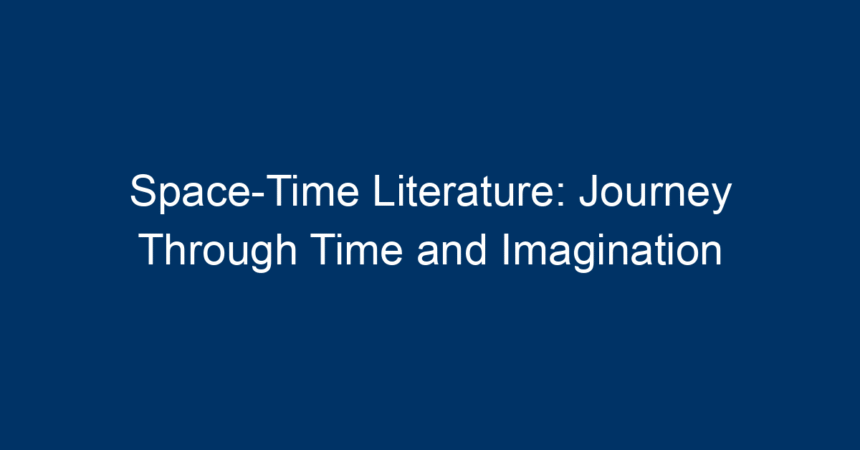Introduction: The Allure of Space-Time
Space-time literature captivates readers by intertwining the concepts of time and space within narratives that are both imaginative and thought-provoking. This genre blends the laws of physics with human experience, creating worlds where time bends, and the fabric of reality can be stretched to its limits. From science fiction to speculative storytelling, space-time literature invites us to explore dimensions beyond our comprehension, prompting us to question the nature of existence itself. Join us as we embark on a journey through this fascinating genre, uncovering its themes, notable works, and its impact on modern storytelling.
Understanding Space-Time: Theoretical Foundations
What is Space-Time?
At its core, space-time is a concept originating from physics, particularly as proposed by Albert Einstein in his theory of relativity. It combines the three dimensions of space with the fourth dimension of time into a single four-dimensional continuum. In literary terms, space-time serves as a narrative framework that allows authors to manipulate temporal and spatial dimensions, creating stories that venture beyond traditional storytelling boundaries.
The Science vs. Fiction Dichotomy
Space-time literature often oscillates between scientific accuracy and creative freedom. Authors may utilize real scientific theories to ground their stories, giving readers a taste of authenticity, or they may choose to embellish these concepts to foster imagination. This interplay creates an exciting tension, engaging readers who crave not only entertainment but also intellectual stimulation.
Themes in Space-Time Literature
Time Travel: A Classic Motif
Time travel is perhaps the most recognizable theme within space-time literature. It allows characters to traverse different eras, exploring the past or future with all its wonders and dangers. Classic works, such as H.G. Wells’ "The Time Machine," lay the foundational groundwork for this theme, while modern interpretations often dive deep into the implications of changing historical events.
Notable Works to Explore:
- "11/22/63" by Stephen King: A gripping novel where a time traveler attempts to prevent a historical tragedy.
- "Kindred" by Octavia Butler: A powerful exploration of slave history through the lens of time travel.
Parallel Universes: The Infinite Possibilities
Another captivating theme is the existence of parallel universes—alternate realities that coexist alongside our own. This concept challenges the notion of a singular timeline and opens up narratives rich with possibilities. Authors can explore ‘what if’ scenarios where choices lead to divergent outcomes.
Must-Read Titles:
- "Dark Matter" by Blake Crouch: A thrilling adventure where the protagonist navigates a world of choices and consequences.
- "The Man in the High Castle" by Philip K. Dick: An exploration of an alternate reality where history has taken a different turn.
The Nature of Reality: Questioning Existence
Space-time literature often invites readers to contemplate the nature of reality itself. Authors challenge characters and readers alike to question what is real, what is imagined, and how perceptions shape our understanding of time and space.
Noteworthy Reads:
- "Slaughterhouse-Five" by Kurt Vonnegut: A nonlinear narrative that wrestles with free will, fate, and the essence of time.
- "The Night Circus" by Erin Morgenstern: A story that bends time and reality through the enchanting world of magic and competition.
The Role of Technology in Space-Time Literature
Advances in Scientific Understanding
As our understanding of the universe evolves, so too does space-time literature. Recent scientific discoveries related to black holes, quantum mechanics, and the multiverse theory provide a rich foundation for storytelling. Authors are inspired by real scientific advancements, weaving complex tales that blend fact and fiction.
Influence on Popular Culture
Space-time literature has permeated various aspects of popular culture, influencing movies, television shows, and even video games. Franchises like "Doctor Who" and "Interstellar" capture the imagination of audiences worldwide, demonstrating the genre’s widespread appeal. As such, the impact of space-time literature stretches far beyond the page, inviting diverse interpretations across media.
How Space-Time Literature Captivates Readers
Engaging the Imagination
At its best, space-time literature stimulates the imagination. It encourages readers to ponder the mysteries of existence and venture beyond conventional boundaries. This genre thrives on curiosity, inviting readers to consider the infinite possibilities of life, whether through whimsical time travel or deeply philosophical explorations.
Emotional Resonance
The emotional depth of space-time literature allows readers to connect with characters on a profound level. Whether it’s the longing for a different time, the sorrow of lost opportunities, or the thrill of discovery, these narratives compel us to confront our own humanity through the lens of time and space.
The Future of Space-Time Literature
New Directions in Storytelling
As society evolves, so will the narratives encircling space-time literature. Contemporary writers are exploring themes like climate change, technology’s role in our lives, and the impact of globalization on personal identity. These fresh perspectives will continue to shape the genre, ensuring it remains relevant and engaging.
Increasing Interdisciplinary Approaches
Collaborations between scientists and authors are becoming increasingly common, with experts contributing to the narrative experience. This blending of disciplines enriches the story, offering a more nuanced understanding of complex concepts within physics and philosophy.
Conclusion: Embracing the Journey
Space-time literature stands as a dynamic bridge between science and imagination, inviting readers to explore the profound questions of existence. As we delve into these narratives, we not only engage with fantastical elements but also confront the essence of what it means to be human.
Actionable Insights
- Read Widely: Explore various subgenres within space-time literature to find what resonates with you.
- Engage with Communities: Join book clubs, online forums, or social media groups focused on speculative fiction to share insights and recommendations.
- Write Your Own Narratives: Try your hand at crafting your story, whether it involves time travel, parallel universes, or a unique blend of realities.
Through this journey into space-time literature, let your imagination soar as you navigate the complexities of time and the infinite horizons of possibility. Embrace the stories that challenge your perceptions and ignite your curiosity, for in the realm of space-time, the boundaries of reality are limitless.




